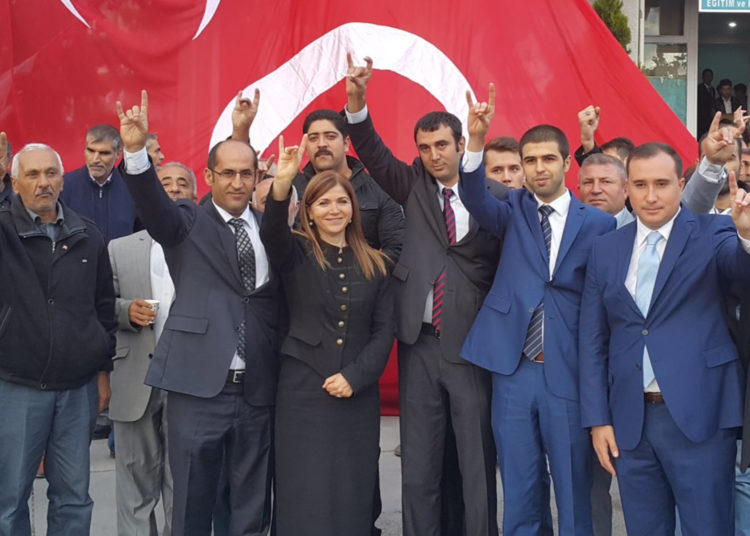Abdullah Bozkurt
Secret Turkish government documents have shown that Zühal Topçu, a member of the executive committee of Turkey’s Nationalist Movement Party (MHP), was investigated for links to designated terrorist group the Turkish Revenge Brigade (Türk İntikam Tugayı, or TİT).
The investigation into Topçu, a 59-year-old academic-turned-politician, was initiated after a series of provocations which took place in Turkey that pitted Turkish groups against Kurds. Tipped off about the TİT’s provocations and links to Topçu on December 9, 2010, the police intelligence unit sought a warrant from the court to wiretap her phone communications.
The intelligence indicated that the TİT was setting up a new armed branch to target Kurds in various Turkish provinces; Cemil Şenel was identified leader of the new group. The preliminary investigation showed that Topçu had frequent contacts with Şenel. That prompted the police to file a motion with the Ankara 12th High Criminal Court on March 15, 2011 seeking the wiretap authorization for three months. Judge Gurcan Acar granted the request the next day.
The wiretap request for Zühal Topçu:
The tip that alerted the police indicated that TİT had organized series of meetings in Turkey to mobilize nationalist figures against Kurds in the aftermath of several incidents. The tip noted that in the meetings the TİT people urged revenge on the Kurds and the abduction of some of them, while others suggested shedding the blood of Kurds and claimed they had no right to life in Turkey. One man admitted that the group was behind a provocation in Hatay’s city of Dörtyol in 2010.
The meetings came in the aftermath of a series of provocations across Turkey. On November 9, 2010 Hasan Şimşek, 21, was killed in a quarrel at Kütahya’s Dumlupınar University. The incident was believed to have been the result of a quarrel between Şimşek, who was defending ultranationalist views, and another youth, M.T., who was defending leftist views. The altercation ended when M.T. stabbed Şimşek to death.
The court judgement authorizing the wiretapping of Zühal Topçu:
On July 25, 2010 in the northwestern city of İnegöl, four people were injured and four police vehicles were set ablaze following a quarrel between two groups. An argument in a small coffeehouse turned violent when three individuals armed with knives and sticks attacked several people. Locals said the argument was the result of hostilities between two bus drivers, one of them from southeastern Turkey and of Kurdish ethnicity. The false information that outlawed Kurdistan Workers’ Party (PKK) militants had killed locals provoked the people into attacking Kurds and their property as well as police vehicles.

Another provocation took place in the city of Dörtyol where a nationalist group set the district’s pro-Kurdish Peace and Democracy Party’s (BDP) office ablaze after four officers were killed in a terrorist attack on a police vehicle in the same city on July 26, 2010. Some residents who heard that a number of suspects had been detained after the attack gathered in front of the Dörtyol Police Department, demanding that the suspects be handed over to them. The group, which continued to grow, ignored calls from officials and police officers to disperse. Members of the group described themselves as Idealists, nationalist youths affiliated with the MHP.
The police intelligence memo on the Turkish Revenge Brigade:
The group then marched to the district’s BDP headquarters and set fire to the fourth floor of the building, where the BDP office was located. The crowd watched the building burn and chanted slogans against the terrorist PKK. Security officials said the locals were provoked, as many young people were urged to take to the streets via SMS messages and phone calls. Individuals from Osmaniye, Erzin and other neighboring cities were reportedly among the nearly 200 people who gathered in front of the police department. The police, tipped off that the crowd was planning to raid the Kurdish-dominated Yeşil neighborhood, tightened security measures around the area and blocked the group.
Police intelligence saw the hand of the TİT behind these incidents and started an investigation into the main culprits. As the investigation deepened, the police found that TİT militants were trying to acquire bombs to attack Kurds in several provinces including Ankara, Istanbul and Antalya. On November 24, 2010 a police operation against the TİT resulted in the detention of 14 people, with six of the suspects –– Hakan Arıkan, Neb, Kutalmış Ocaklı, Erce Anıl Başıbüyük, Abdurrahman Ozan İşleten, Süleyman Aygün and Halil Yıldırım — formally arrested on charges of membership in the TİT and inciting the public to hatred and animosity. After the operation the TİT released a statement condemning the crackdown and declaring a new war of independence in Turkey.

Police intelligence continued to decode the network after the November operation and tapped Topçu’s phone. The request followed a wiretapping authorization motion filed on March 14, 2011 with the court which stated that the phones of suspects identified as Murat Mantuş, Murat Çeliker and Bilal Aydın needed to be tapped in order to expose the TİT’s wider network in the country. The MHP nominated Topçu as candidate for a seat in parliament in the June 2011 elections, providing her immunity from any prosecution. She was promoted to deputy chairman of the MHP, which is led by far-right leader Devlet Bahçeli. She resigned from the deputy chairmanship in August 2016, citing family issues, but retained her position on the party’s executive board.
In the meantime, all the suspects were freed by the government of Recep Tayyip Erdoğan, later and the TİT managed to escape a real crackdown in Turkey. The investigators who had probed the TİT network were punished by the government with dismissal and imprisonment on dubious charges.
The police intelligence brief filed with the court for wiretapping authorization and an appended explanatory note on the Turkish Revenge Brigade:












